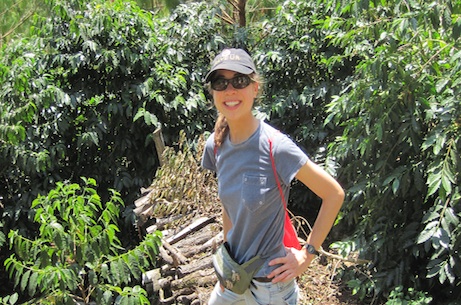
Scholar Elect Madeline Weeks has studied the cultural history of chocolate and is now focused on the economic history and impact of coffee growing.
At the age of seven Madeline Weeks spent six months selling lemonade to raise $30 to buy an acre of rainforest. Raised by a family who spent summers camping, she felt a deep connection to the land even at a young age and a desire to protect it after listening to a school assembly on threats to the Amazon.
When she was at high school she set up a culinary club to get students excited about home cooking. The first food they focused on was chocolate after Madeline read in a book that if humans continue to destroy the rainforest at the current rate people would have to live in a world without chocolate. “Chocolate pulled together my interest in protecting the land and my deep love of food,” she says.
The club studied the origins of chocolate, tasted different types of chocolate and visited a chocolate factory. “The club was not so much about food but about learning to interact with and appreciate other cultures through the lens of food,” adds Madeline.
This early interest in chocolate has fuelled her subsequent research which has focused first on Mexican history and the origins of chocolate and more recently on coffee production. Madeline’s interest in food stems in large part from her Chinese grandfather. He has been a political activist, university economics professor, law student and has run a Chinese restaurant. “He had a great love of food and through him I learnt how to taste,” she says. “He expressed his love through cooking and I discovered Chinese culture through food.”
When she went to Wellesley College Madeline already knew what she wanted to do research into the origins of chocolate. In her summer vacation before starting college she had visited Mexico with her school Spanish club, which she started, and had fallen in love with the culture and cuisine. That included the use of chocolate in dishes like mole and the origins of its use by ancient civilisations. “I was interested in learning about its use in rituals. It was considered the food of the gods and had the value of money. In Mexican culture the use of chocolate is very complex and varies according to region. Learning why chocolate was so important became the premise of my undergraduate thesis,” says Madeline.
She chose Spanish as her first major at Wellesley College in Massachusetts, then declared Economics as a second after being introduced to the discipline and inspired by her mentor Professor Corrine Taylor.
Chocolate production
During her four-year degree she spent summer vacations working at the Institute of International Education in San Francisco and The Economist in Beijing. In her fourth year she went to Mexico and visited Oaxaca to watch chocolate production and Tabasco to see where cacao is grown. She talked to everyone from farmers to mole makers. All of this fed into her undergraduate research. After she graduated from Wellesley College she started a job in finance, but didn’t find it very satisfying because she felt compelled to continue academic research with real-world application. Before moving on to work at the Bill Lane Center for the American West, an interdisciplinary center at Stanford University, she returned to Mexico for a month to seek research collaborations.
“I felt the topic of what the future of chocolate might be had not been addressed,” she says. She approached different universities in Mexico about studying ecology, but says her background in economics made many sceptical about taking on a non-scientist. Then she came across the Institute of Ecology in Veracruz which runs the Cafe in Red project, an interdisciplinary research initiative to address the environmental and social aspects of coffee production in light of the crisis of falling coffee prices. “They had been focused more on biological research, but they were interested in what I would bring as an economist,” she says.
Madeline gained a nine-month Fulbright-Garcia Robles Scholarship to study there and started last summer. She says: “Coffee is similar to chocolate in the sense that both may be grown in shaded, biologically diverse environments that promote ecological sustainability. They are both critical in socio-economic terms as millions of small-scale farmers who depend on growing these commodities as their principal economic activity. However, coffee is more economically important in Mexico today as one of the country’s primary agricultural exports.”
She wants eventually to do a PhD, but felt she needed to get more experience of doing academic research. Her mentor at Wellesley suggested she look at geography as the discipline which would unite her interests in culture and economics. From there she discovered the University of Cambridge’s Geography Department. She will study for an MPhil in Geographical Research, using her research on coffee as launchpad to work on broader issues connecting issues on the farm level with national economic interests and global sustainability.












